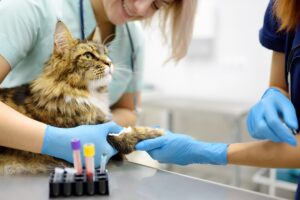
In many cases, the cause of IMHA in dogs and cats is unexplained.
Immune mediated hemolytic anemia (IMHA) has been reported in small animals for over 80 years but there has not been a perfect treatment for the disease. However, 75% of dogs with this condition can fully recover and lead a normal life with careful treatment. Learn more about IMHA in dogs and cats below.
What Is Immune Mediated Hemolytic Anemia?
Immune mediated hemolytic anemia is a serious and potentially fatal condition that impacts dogs and cats. This signifies that your pet’s immune system (which generally fights off invaders and infections) is now fighting your pet’s own red blood cells. This may destroy red blood cells, causing anemia and inflammation throughout your cat’s or dog’s body. Fortunately, there are newer drugs and treatment options for your pet, increasing the survival chances of your furry animal recovering.
Causes
In many cases, the cause of IMHA in dogs and cats is unexplained. There might be a trigger, such as a virus, which initially disturbs the immune system and causes the disease that might have disappeared over time. Your veterinarian might recommend that an x-ray or ultrasound examination is performed to seek an underlying cause, especially if your pet is older.
Signs or Symptoms
Signs of immune mediated hemolytic anemia in your pet might include weakness, yellow or pale gums, collapse, or increased breathing rate. In addition, some dogs will present with black or red urine. Many dogs have a fever, and most don’t feel well, having a poor appetite or experiencing vomiting.
Diagnosis
A diagnosis is typically straightforward – your veterinarian will often discover the tell-tale signs during a physical exam and recommend blood work. A specific blood value, known as PCV, gives you a quick count of your dog’s red blood cells as a percentage. Anything less than 35% indicates that your dog is anemic. There are multiple classic signs that may be seen on a blood test that can confirm IMHA. However, additional examinations might occasionally need to be performed to ensure the correct diagnosis.
Treatment
Treatment for IMHA in dogs and cats have evolved over the years and we currently have the available options:
Immunosuppression
Prednisolone is a steroid that quickly suppresses the inflammation and the animal’s immune system’s attack on the red blood cells. However, steroids come with side effects when used for a long time, so this medication is generally tapered over 3-6 months until your pet recovers.
Blood Transfusions
Depending on the severity of the anemia, the pet may require at least one blood transfusion, and others might even need two or more. While there are risks associated with blood transfusions, they are only used when necessary and would be life-saving.
Blood Clot Prevention
A prevalent and often fatal complication of IMHA is the development of blood clots. Prevention of blood clots has been one of the significant improvements in IMHA treatments over the past decade, with blood thinners being standard practice now.
Supportive Care
Pets with IMHA are typically very sick and require constant monitoring and support while they are in critical condition. Some animals require IV fluids to keep them hydrated or oxygen support in some cases.
Prognosis
IMHA is often fatal if left untreated. It is imperative you have your pet evaluated as soon as possible to start immediate and aggressive treatment. During the acute phase of disease, mortality is mostly due to lack of response to treatment or pulmonary thromboembolism. Once your pet is stable and beyond the acute phase, the prognosis is much better. Pets can still experience a relapse, which is why careful attention to lifestyle and continued care is important. With modifications, pets that have experience IMHA can live perfectly normal lives.
HERE AT MOUNT CARMEL ANIMAL HOSPITAL, WE’LL TREAT YOUR PETS LIKE FAMILY!
Mount Carmel Animal Hospital has been serving the Northern Baltimore/Southern York community for over 30 years and is proud to be an independently operated, small animal practice committed to excellence in veterinary medicine and client service. From grooming to wellness services, along with Canine Life Skills Training Courses, and surgical procedures, we have the expertise that will best serve the needs of you and your pet. Contact us at 410-343-0200 and follow us on Facebook
